Guides
Best Web Hosting Providers In The Middle East
Discover the top web hosting providers in the Middle East. We delve into key features, pricing, customer service, and more.

So, you have an idea for a website aimed at the Middle East region, and you’re looking for a reliable web hosting provider with servers located in the same geographical area to ensure your site runs smoothly and reliably.
We know that navigating through the wide range of web hosting options available in the Middle East can feel like crossing the Sahara without a map or a compass. That’s why we’ve compiled this list of the best web hosting providers in the Middle East.
Why Choose A Middle Eastern Web Hosting Provider?
Choosing a web hosting provider for your site is much like choosing the perfect location for your brick-and-mortar store. You want to position yourself where your audience can easily reach you. Why? Because you can unlock the following benefits:
- Enhanced Performance: Servers located closer to your audience mean faster load times and a smoother user experience. This proximity reduces the latency between the user’s request and the server’s response.
- Improved SEO: Search engines like Google take server location into account when determining your site’s ranking. By hosting your site on servers located in the Middle East, you’re signaling to search engines that your content is relevant to users in this region.
- Local Customer Support: There’s nothing like speaking to someone who understands your language, both literally and culturally. Local providers typically offer customer service in regional languages and are more likely to be attuned to the needs and expectations of Middle Eastern customers.
- Easier Regulatory Compliance: The Middle East has specific online regulations, and opting for a local provider ensures your website is built and maintained in line with these regional regulations, providing peace of mind that you’re on the right side of the rules.
Now, you understand why choosing a Middle Eastern web hosting provider is a smart move. Before we list our top picks, let’s briefly go over some of the most important selection criteria we considered when compiling this list.
Note: It takes more than the right web hosting provider to create a successful website.
How To Choose A Web Hosting Provider In The Middle East?
Choosing the best web hosting provider in the Middle East isn’t difficult because there are several important factors you should always take into account:
- Uptime: Uptime refers to the percentage of time your website is accessible and running. Ideally, you want a web host that offers an uptime of 99.9% or better because, let’s face it, a website that’s often down doesn’t make a good impression on your visitors.
- Performance: Performance is all about how fast your website loads for your visitors. Look for a host with high-speed servers and optimized technologies that ensure your website loads quickly because loading speed is an important ranking factor.
- Scalability: Your website will grow over time, and so will your hosting needs. Look for a provider that offers scalable plans, allowing you to easily upgrade as your traffic and resource needs increase.
- Extras: The best web hosting providers make it easy to obtain and install SSL certificates, set up email accounts, get popular content management systems like WordPress up and running, and more.
- Customer Support: If things go wrong, you want to be sure you can reach out to a knowledgeable and responsive customer service team, preferably 24/7. Because the last thing you want is to be left in the lurch with a broken website.
- User Reviews: Don’t just take the provider’s word for it. Check out user reviews and ratings on independent review sites. They can offer valuable insights into a provider’s reliability and the quality of their service.
- Price: While price shouldn’t be your sole deciding factor, it’s definitely important. Look for a provider that offers transparent pricing and gives you good value for your money. Remember, the cheapest isn’t always the best.
We considered all these factors when compiling our list of the best web hosting providers in the Middle East, and now it’s time to reveal who made the cut.
Top 7 Best Web Hosting Providers In The Middle East
When going through our selection of the best web hosting providers in the Middle East, you should remember that your ultimate choice should reflect your specific personal needs. You might be hunting for the best shared hosting package to save costs, or you might be a large business requiring a robust dedicated server. If you take these various personal factors into consideration, you should end up with a web hosting provider that you won’t want to leave anytime soon.
#1- AEserver
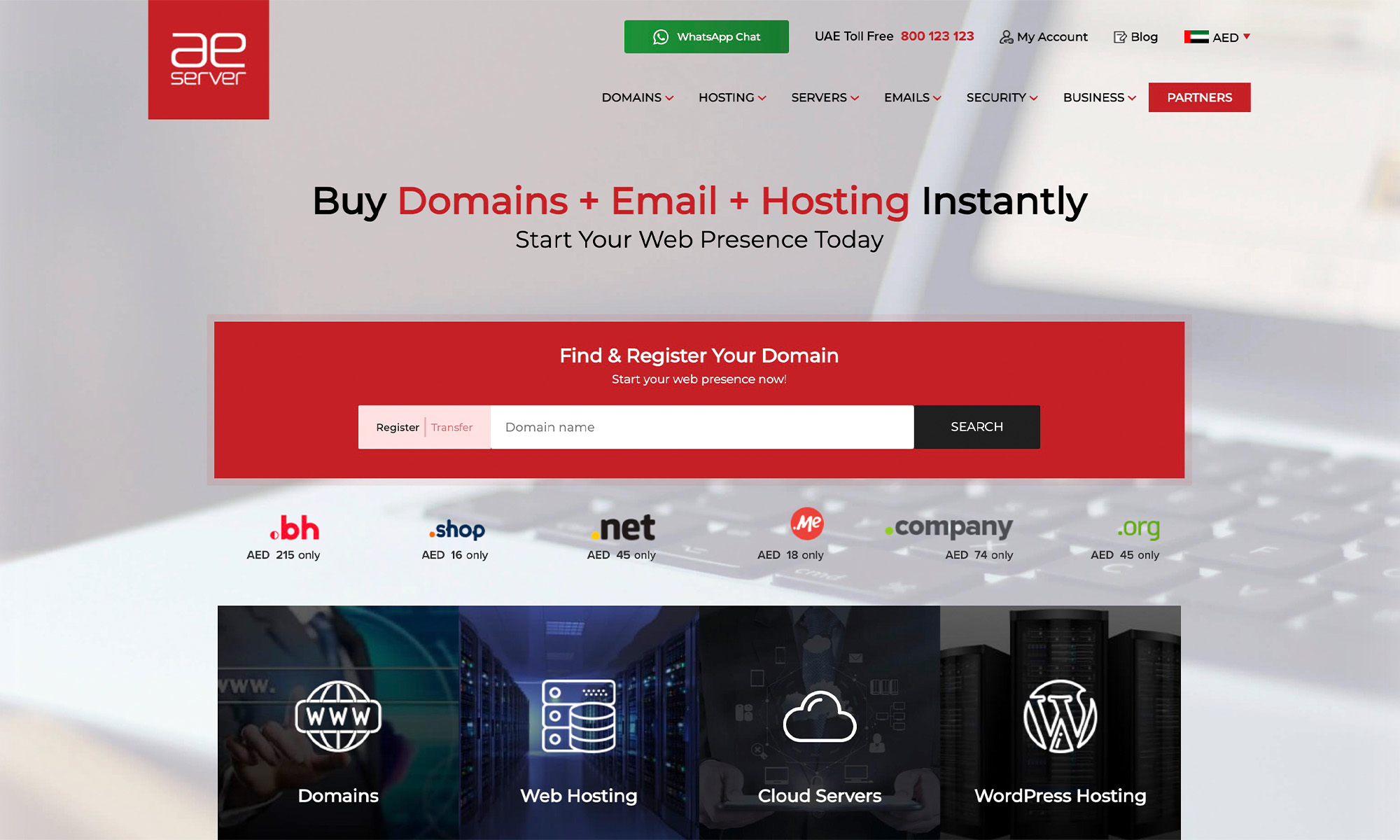
🖥️ Web Hosting Types: Linux hosting, Windows hosting, managed WordPress, cloud VPS, dedicated servers, colocation in Dubai, private cloud
⬆️ Uptime Guarantee: 99.99%
🌍 Server Location: United Arab Emirates, and other locations
Established in the UAE in 2005, AEserver has evolved from a simple domain name registration service to a robust web hosting provider renowned for its excellent performance and value for money. Hosting over 50,000 websites globally, this top-rated provider has indeed come a long way.
With a diverse offering of hosting types, AEserver caters to a broad spectrum of users, so it should be able to meet your needs regardless of what you’re looking for. Its 4.8/5 rating from over 500 reviews speaks volumes about the company’s service quality and reliability.
AEserver’s commitment to customer satisfaction is clear in its support structure. With phone support available during Dubai business hours from Saturday to Thursday and a ticket-based issue management system, the web hosting provider ensures prompt and helpful responses to all inquiries. However, it’s important to note that it currently offers support in English only.
👍 Pros:
- Excellent user reviews
- Great uptime guarantee
- Plenty of web hosting plans to choose from
- Responsive customer support
👎 Cons:
- English only
#2- A2 Hosting
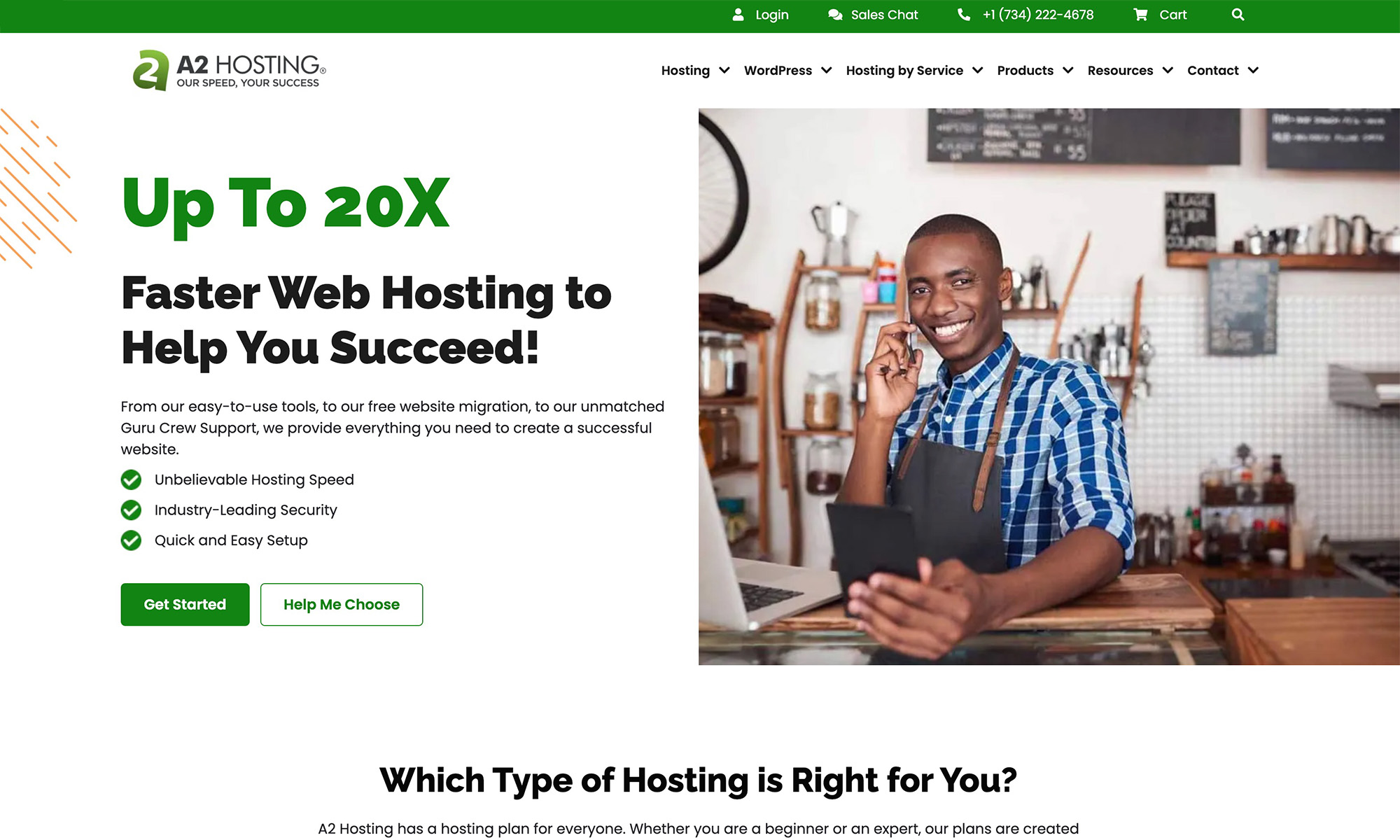
🖥️ Web Hosting Types: Shared hosting, VPS hosting, dedicated hosting, reseller hosting, email hosting, cPanel hosting, turbo hosting, WordPress hosting
⬆️ Uptime Guarantee: 99.9%
🌍 Server Location: Israel and other locations
If you’re looking for a hosting provider that’s not just reliable but also extraordinarily fast, A2 Hosting might be right up your alley. Established in 2003, this Linux-based hosting provider stands apart from the crowd with its Turbo hosting plans, which are advertised to be 20 times faster than the industry average. This makes A2 Hosting a solid choice for websites that are content-rich or expecting high levels of traffic.
A2 Hosting has certainly built a reputation for excellent customer service, with 24/7/365 live support and a 97% customer recommendation rate. What’s more, it also offers a wealth of freebies with each hosting plan, such as an SSL certificate, site migration, and robust security protections.
However, it’s worth noting that while the introductory prices of A2 Hosting plans are enticingly low, their renewal rates can be relatively steep. So, ensure to take this into account when budgeting for your website’s hosting needs.
👍 Pros:
- Many web hosting types to choose from
- First-class customer service
- Great speed
- Plenty extra goodies
👎 Cons:
- No Windows server options
- Expensive renewals
#3- Alibaba Cloud
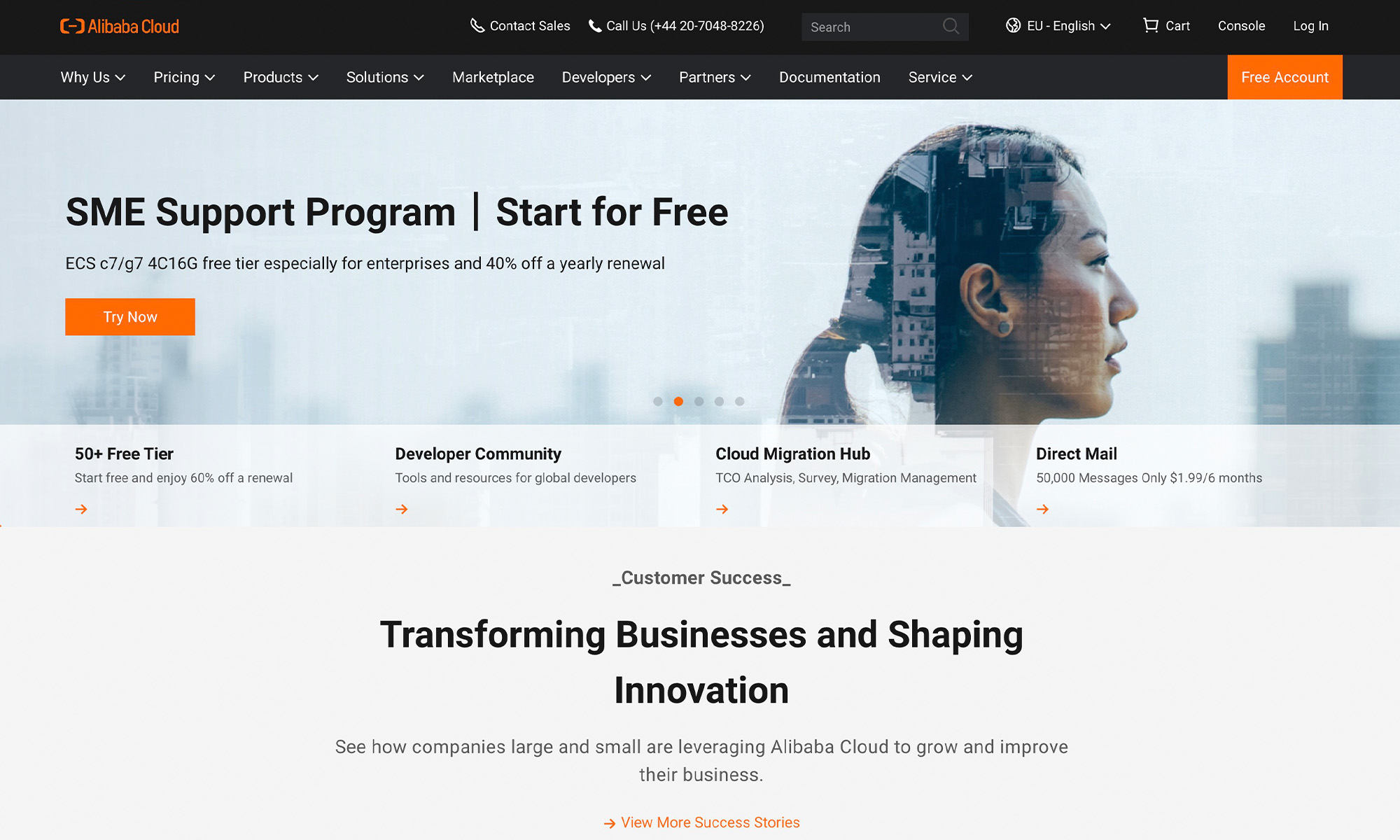
🖥️ Web Hosting Types: Virtual cloud servers
⬆️ Uptime Guarantee: 99.50%
🌍 Server Location: United Arab Emirates, Saudi Arabia, and other locations
As a subsidiary of the Alibaba Group, Alibaba Cloud, formerly known as Aliyun, has been delivering solid cloud computing services since 2009. The web hosting provider has data centers in most geographical regions, including the Middle East, making it a great choice for those who want global reach.
Indeed, Alibaba Cloud is geared toward enterprise customers, offering cloud services like elastic computing, relational databases, big-data processing, storage hosting, and others. Even the custom control panel is tailored more towards advanced users, and beginners who are used to one-click installers are guaranteed to find it difficult to use.
The good news is that a free trial for new users is available, so you can test out its services before fully committing. Should you have any questions or run into any issues, you can contact Alibaba Cloud’s customer support staff using different channels, including live chat, ticket system, and toll-free telephone service.
👍 Pros:
- Wide range of enterprise-level cloud-related services
- Multiple data center locations
- Free trial for new users
- Comprehensive customer support
👎 Cons:
- Virtual cloud servers only
- Too complicated for beginners
#4- eHosting DataFort
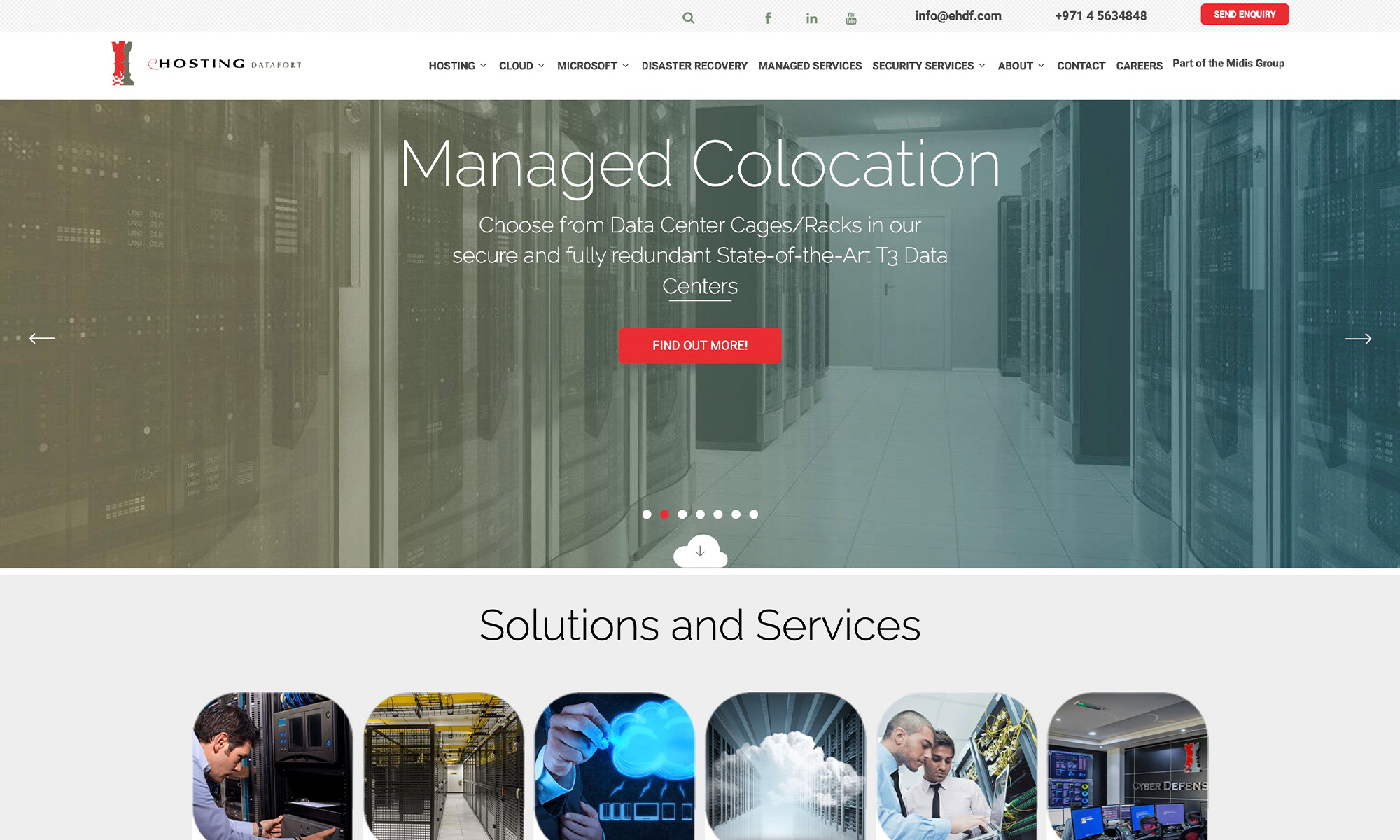
🖥️ Web Hosting Types: Colocation, managed colocation, managed hosting, hosted dedicated cloud, private cloud, public cloud
⬆️ Uptime Guarantee: 99.9%
🌍 Server Location: United Arab Emirates
If you’re after top-notch reliability, then eHosting DataFort is your go-to option. Founded in 2001, this Dubai-based web hosting provider owns and operates multiple Tier 3 data centers with completely redundant power and cooling systems. Indeed, the web hosting provider offers an uptime guarantee of 99.9%, so your website shouldn’t be down for more than 1 minute and 30 seconds per day.
As far as compliance goes, eHosting DataFort has you covered with ISO 9001, 20000, 22301, 27001, and PCI-DSS certifications. The web hosting provider has also nabbed the prestigious Cloud Security Alliance (CSA) STAR Certification, being the first in the region to achieve this feat.
But no web hosting is perfect, and eHosting DataFort has one major limitation too: it operates from just one location, which is in the UAE. This means if your target audience is spread across other Middle Eastern countries, the latency might be slightly higher compared to a provider with multiple server locations in the region.
👍 Pros:
- Great reliability
- Many compliance certifications
- Attractive prices
👎 Cons:
- Only one server location
#5- SkyHost
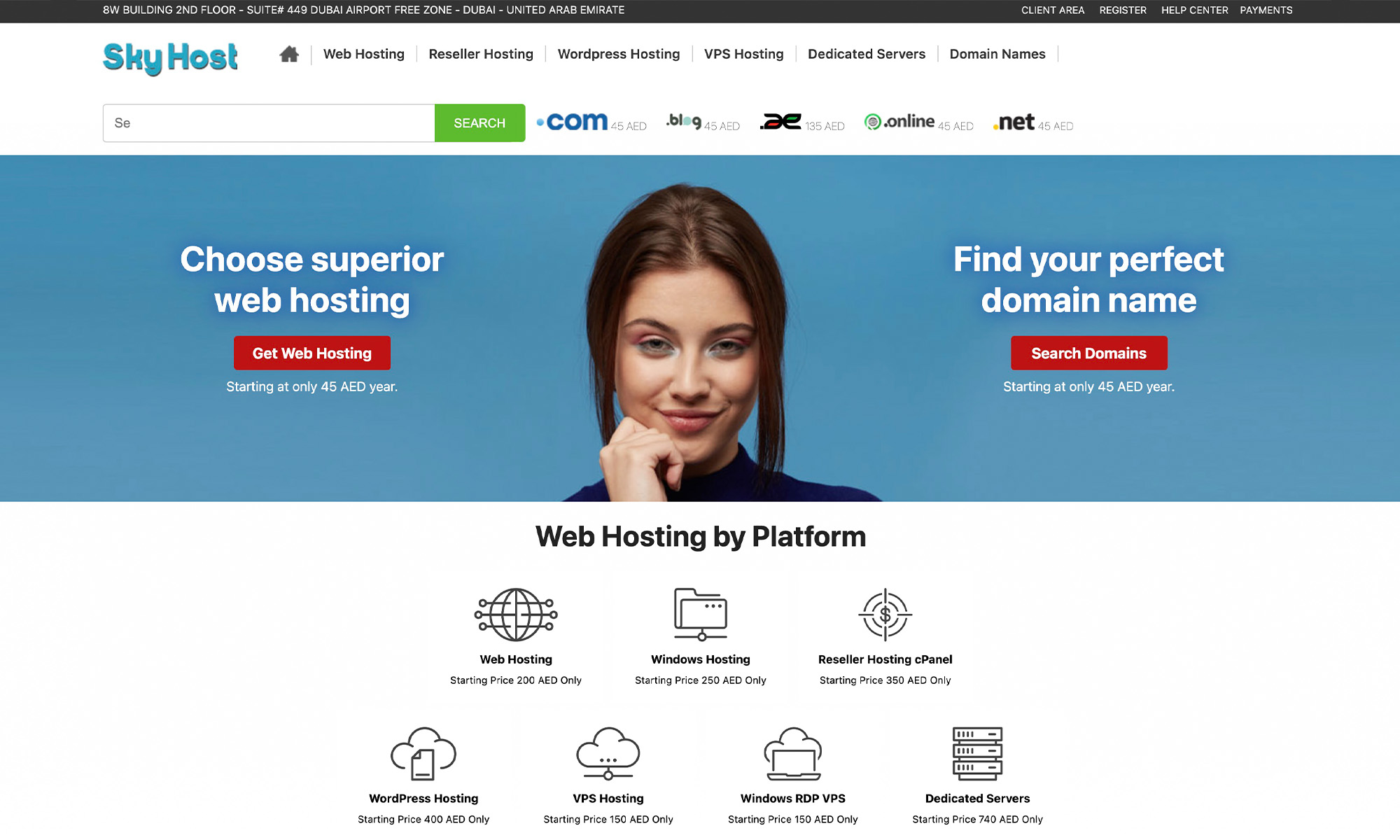
🖥️ Web Hosting Types: Web hosting, reseller hosting, WordPress hosting, VPS hosting, dedicated servers
⬆️ Uptime Guarantee: 99.99%
🌍 Server Location: United Arab Emirates
SkyHost offers an excellent blend of affordability and performance while covering almost the entire spectrum of hosting services. Thanks to its impressive uptime guarantee of 99.99% and servers conveniently located in the UAE, the web hosting provider is perfectly equipped to serve businesses and individuals looking to establish a robust and reliable online presence in the Middle East.
If you’re a web hosting beginner, then you’re guaranteed to appreciate SkyHost’s easy-to-use cPanel powered by Cloudlinux and over 300 one-click installs (including WordPress, Magento, and OpenCart). Migrating from a different web hosting to SkyHost is also easy thanks to a free hosting migration service.
Our biggest dislike is the lack of monthly billing. As a SkyHost customer, you can choose only from annual, biennial, or triennial billing, and we think that’s not flexible enough.
👍 Pros:
- Impressive uptime
- Great for beginners
- Free migration service
👎 Cons:
- No monthly billing
#6- Premium RDP
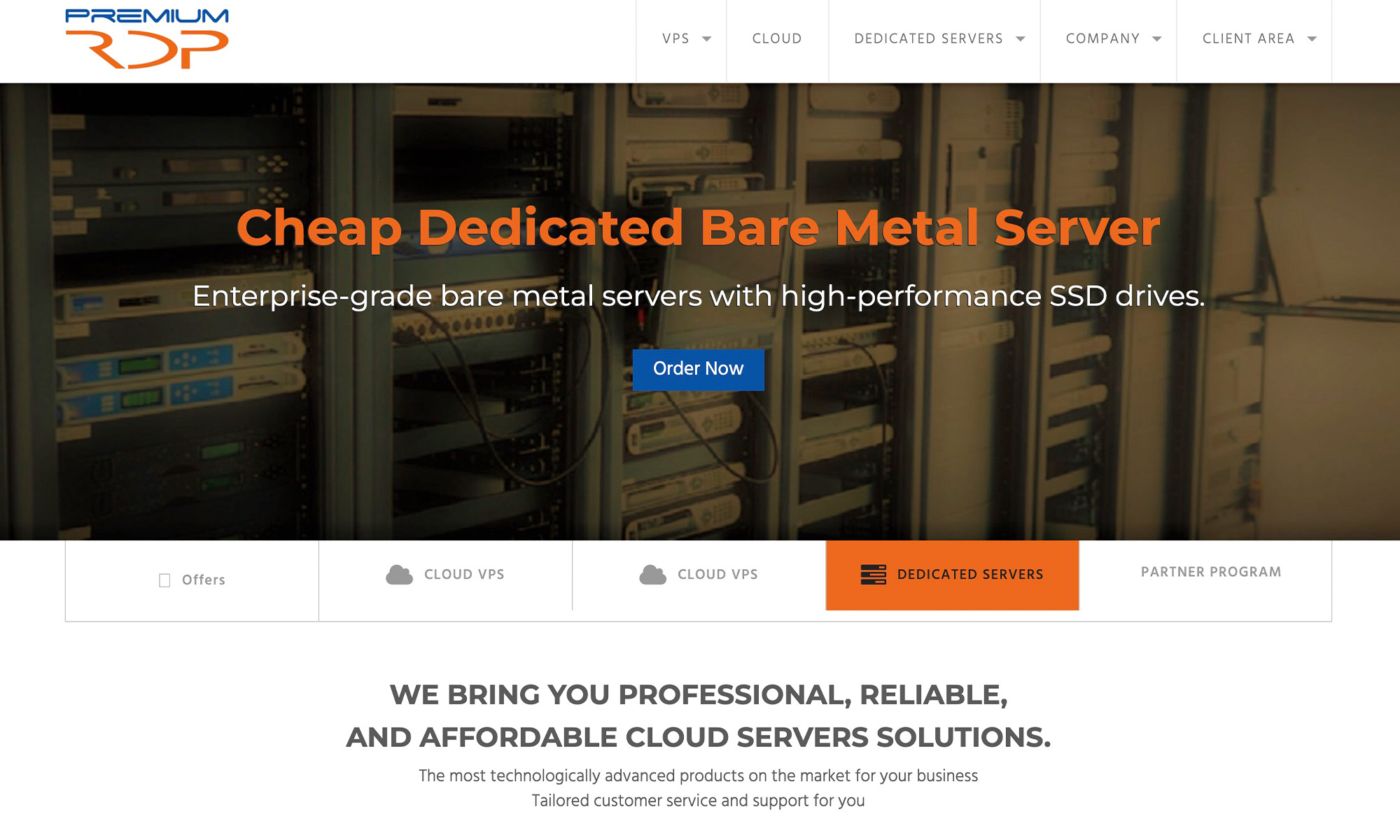
🖥️ Web Hosting Types: Cloud VPS, dedicated servers
⬆️ Uptime Guarantee: 99.99%
🌍 Server Location: Saudia Arabia, Pakistan, United Arab Emirates, and other locations
Premium RDP brings you robust, reliable, and cost-effective cloud servers tailored for businesses looking for a high-quality web hosting experience. Its offering extends across 195+ global locations and 750+ data centers.
One of the standout features of Premium RDP is its custom-made cloud management panel. This full management system allows you to monitor individual servers, manage staff accounts, view bandwidth and usage reports, and more.
Perhaps because Premium RDP makes it so easy for customers to self-manage their accounts, the company doesn’t provide a phone support number. Only a ticketing system is available, and that’s not enough for emergency-level issues.
👍 Pros:
- A diverse range of hosting options
- Fast RAID SSD storage
- Automated daily and weekly backups
👎 Cons:
- No support phone number
#7- EXAHost
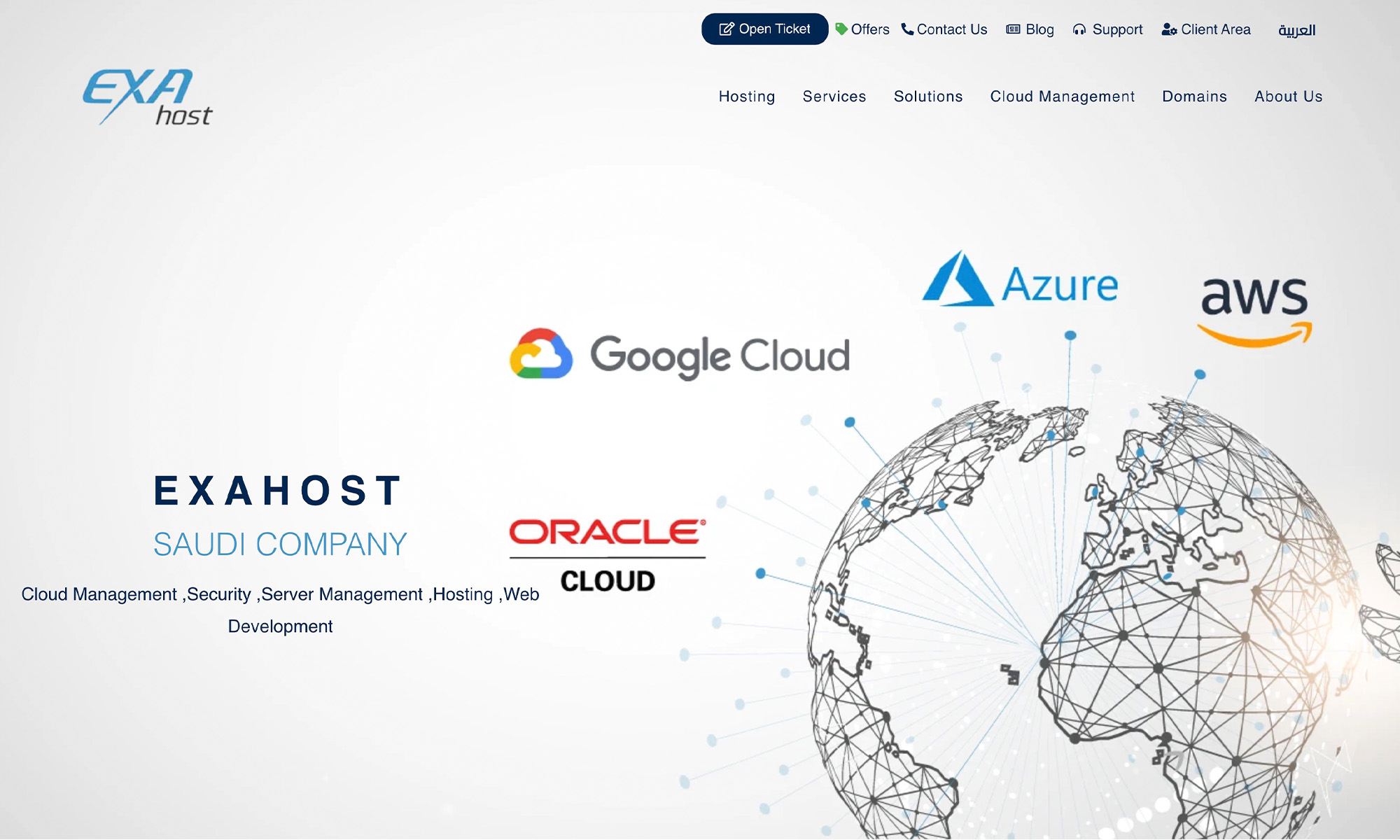
🖥️ Web Hosting Types: Shared hosting, VPS hosting, dedicated servers, mail hosting
⬆️ Uptime Guarantee: 99%
🌍 Server Location: Saudi Arabia
Beginning its journey in Saudi Arabia 20 years ago, EXAHost has since then dedicated itself to enhancing the Arabian and Saudian online presence. With a vision centered around fortifying Arabic content online, the web hosting provider has persistently worked towards developing web solutions that meet the highest standards.
EXAHost offers a variety of hosting plans to accommodate the needs of various types of clients, and they all come with exceptional 24/7 technical support and a user-friendly control panel.
One slight downside of EXAHost is its 99% uptime guarantee, which is slightly less than the industry standard of 99.9%. Over a year, the difference between 99% and 99.9% uptime adds up to more than 3 full days of downtime, and that’s quite a lot.
👍 Pros:
- Has been around for a long time
- Personal approach
👎 Cons:
- Uptime guarantee of only 99%
Conclusion
Choosing the right web hosting provider is a pivotal decision in your website’s journey. The best web hosting providers in the Middle East offer not only great value for money but also provide the advantage of geographical proximity to your audience. Remember, your personal needs should guide your choice, whether you’re a small blogger in search of a cost-effective shared hosting plan or a big business looking for a powerful dedicated server. So take your time, review your options, and make an informed decision.
FAQs
The best web hosting providers in the Middle East include AEserver, A2 Hosting, Alibaba Cloud, eHosting DataFort, SkyHost, Premium RDP, and EXAHost.
Choosing a Middle Eastern web hosting provider can enhance the performance of your site for regional users because server proximity can result in faster load times.
Managed hosting means the hosting company handles the day-to-day management of the hardware, operating systems, and standardized applications. This service can be beneficial if you don’t have the technical expertise in-house. On the other hand, with unmanaged hosting, you’re essentially renting a server, and the necessary management and maintenance are your responsibility.
A domain name is the address that internet users can enter into a web browser to access your website. Think of it as the address of your house. Web hosting, on the other hand, is the space on a server where all the data that makes up your website is stored. This can be likened to the physical house itself.
Shared hosting, where multiple websites are hosted on the same server, is a cost-effective option suitable for small websites with less traffic. Dedicated hosting, where a whole server is reserved for a single website, offers more resources and greater control over the server. This option is best for large businesses and high-traffic websites.
Guides
The Most AI-Proof Career Opportunities In The Middle East
Concerned about AI’s impact on your career? Discover the most AI-proof job opportunities thriving in the Middle East and beyond.

The rise of artificial intelligence (AI) is sending shockwaves through the global workforce, transforming industries and displacing jobs at an unprecedented pace. Writers, graphic designers, web developers, transcriptionists, translators, and many others have seen their roles dramatically impacted in just the past two years (since the release of ChatGPT).
Given these rapid developments, it’s no surprise that people across the Middle East and other regions are increasingly looking for AI-proof their future. If you count yourself among them, you’ve come to the right place. In this article, we’ve thoroughly researched and compiled a list of career opportunities (presented in no particular order) that are likely to thrive in the Middle East despite the ongoing AI revolution.
Summary Of AI-Proof Career Opportunities:
| Career | Average Base Annual Salary (AED) |
| Artificial Intelligence Specialists | 171,000 |
| Maintenance Technicians | 48,000 |
| Doctors | 252,000 |
| Registered Nurses | 84,000 |
| Social Workers | 85,000 |
| Elementary And High School Teachers | 83,000 – 85,000 |
| Emergency Responders | 100,000 |
| Skilled Tradespeople | 60,000 |
Artificial Intelligence Specialists
💵 Average Base Annual Salary (Source): AED 171,000
It’s probably no surprise that one of the most career opportunities in the Middle East lies in the heart of the AI industry itself. The AI boom has naturally led to a surge in demand for professionals who have a deep understanding of the technology and can develop, implement, and troubleshoot AI systems.
In the United Arab Emirates, the number of AI workers quadrupled to 120,000 from 2021 to 2023, according to Al Olama, the UAE’s AI Minister, as the country pushes forward with its ambitious goal of becoming a global AI hub by 2031. The UAE is investing heavily in AI education and research, establishing dedicated AI universities and research centers to nurture local talent and attract international experts.
To become an AI specialist, you need to have a strong foundation in computer science, mathematics, and statistics. That’s why most AI specialists hold at least a bachelor’s degree in one of these fields, although many also pursue advanced degrees such as a master’s or Ph.D. to deepen their expertise and stay at the forefront of the rapidly evolving AI landscape.
Maintenance Technicians
💵 Average Base Annual Salary (Source): AED 48,000
The impact of AI extends far beyond the digital realm, as advanced robotics and intelligent machines are poised to revolutionize the physical world. Multiple companies, including Boston Dynamics, Tesla, and Figure AI, are working on developing general-purpose humanoid robots capable of performing a wide range of tasks guided by advanced AI reasoning.
As these sophisticated machines become more prevalent, they are expected to take over an increasing number of jobs in warehouses, factories, and hazardous environments. While this may lead to the displacement of some human workers, it also creates a growing demand for skilled maintenance technicians who can keep these complex systems running smoothly.
To succeed in this field, aspiring maintenance technicians should consider pursuing vocational training or a degree in mechatronics, robotics, or a related field. Hands-on experience through internships, apprenticeships, or industry collaborations can also be invaluable in developing the practical skills needed to excel in this role.
Doctors
💵 Average Base Annual Salary (Source): AED 252,000
In the Middle East, countries like Saudi Arabia, Qatar, and the UAE have shown a particularly strong willingness to embrace AI in healthcare, with two-thirds of their populations open to the idea of replacing doctors with robots, compared to just 55% across Europe, the Middle East, and Africa as a whole, according to a PwC study (PDF).
However, despite the rapid advancements in AI technology, doctors are unlikely to be made obsolete anytime soon. Instead, AI will become an invaluable tool that complements and enhances the expertise of medical professionals, enabling them to provide better care to their patients.
AI is already being used in various healthcare applications, from accelerating the development of new cures, enhancing disease detection, and improving patient outcomes. These developments have not gone unnoticed by UAE leaders, with the country’s National Artificial Intelligence Strategy 2031 placing significant emphasis on the healthcare field and the Ministry of Health and Prevention (MoHAP) launching the UAE health sector’s first Centre of Excellence (COE) for AI in October 2023.
Registered Nurses
💵 Average Base Annual Salary (Source): AED 84,000
Just like doctors, registered nurses are unlikely to be replaced by AI anytime soon, despite the development of robot nurses. The human touch, care, and empathy provided by nurses are invaluable, especially during times of sickness and vulnerability.
In fact, the demand for registered nurses in the Middle East is growing rapidly due to the region’s expanding population and the increasing healthcare needs of an aging demographic.
A recent report on the impact of AI on the Middle Eastern healthcare landscape predicts that the UAE will require an additional 15,000 nurses and allied health professionals in Abu Dhabi and 11,000 nurses in Dubai by 2030 to keep pace with the country’s healthcare needs. As a result, registered nurses can expect ample job opportunities in the Middle East, with AI serving as a tool to enhance their work rather than replace them.
Social Workers
💵 Average Base Annual Salary (Source): AED 85,000
The role of social workers is expected to remain essential and largely unaffected by automation. Social workers provide crucial support, guidance, and advocacy for individuals, families, and communities facing challenging circumstances, and the demand for their services is growing in the Middle East.
According to a recent statistic, the revenue of the human health and social work activities industry in the UAE is projected to reach approximately 5.9 billion U.S. dollars by 2024. This growth indicates a promising future for social workers in the region, as their skills and expertise will be increasingly sought after to address the diverse needs of the population.
For example, social workers have career opportunities in special needs centers, schools, geriatric and psychiatric hospitals, and other social service organizations. Depending on the specific role, such as social therapist, school counselor, or special needs teacher, obtaining a license may be required.
Elementary And High School Teachers
💵 Average Base Annual Salary (Source): AED 83,000 – 85,000
While AI is set to play a significant role in the education sector, it’s extremely unlikely to replace teachers entirely. Instead, AI will augment and support the work of educators.
According to the World Economic Forum, AI can assist teachers by automating administrative tasks, such as grading and record-keeping, allowing them to focus more on personalized interactions with students and enhancing the overall quality of education. Another exciting application of AI in education is the personalization of learning content and experiences. AI-powered systems can adapt to individual students’ needs, learning styles, and abilities, providing tailored support and resources to optimize their learning outcomes.
This creates new opportunities for tech-savvy teachers and those willing to embrace AI in their teaching methods. A teacher who understands modern AI tools and knows how to incorporate them effectively into their lesson plans will be highly sought after.
Emergency Responders
💵 Average Base Annual Salary (Source): AED 100,000
The jobs of emergency responders, including firefighters, paramedics, and police officers, are very safe from AI automation. The critical, hands-on nature of their work, which often requires split-second decision-making, empathy, and adaptability in unpredictable situations, guarantees that human responders will remain essential even in the future.
However, AI has the potential to revolutionize emergency response by assisting responders in various ways. Companies like Omdena are pioneering AI solutions to improve emergency response management, preparedness, and response.
For example, Omdena’s AI models analyze historical data, weather patterns, and other factors to predict the likelihood of emergencies such as floods, wildfires, and earthquakes. They also help optimize resource allocation and coordinate the response of different agencies to improve the efficiency and effectiveness of disaster relief operations.
Skilled Tradespeople
💵 Average Base Annual Salary (Source): AED 60,000
In the short term, skilled tradespeople can rest easy knowing that AI won’t be fixing leaky toilets, unclogging drains, or rewiring electrical panels anytime soon. The complex problem-solving skills and dexterity required for these tasks are still beyond the capabilities of current AI systems.
However, the medium and long-term outlook for trades in the Middle East is more complicated. As AI disrupts various industries, many people are considering transitioning to trades as a safer career option. This influx of new workers could potentially increase competition and put downward pressure on wages, especially for entry-level positions.
Moreover, in wealthier parts of the Middle East, the demand for skilled tradespeople is often met by workers from South Asia who are willing to accept lower wages. Despite these challenges, established tradespeople with a strong reputation and a loyal customer base can still thrive in the AI era by providing high-quality work and excellent customer service.
Conclusion
Even though the AI revolution is expected to disrupt the entire job market and make many traditional career paths obsolete, there are still plenty of work opportunities in the Middle East remain resilient against automation. Generally, the most AI-proof career opportunities are those that either directly contribute to the development and implementation of AI technologies or require uniquely human skills such as empathy, creativity, and critical thinking.
-

 News4 weeks ago
News4 weeks agoAmazon Prime Day 2024: Get Ready For 6 Days Of Amazing Deals
-

 News4 weeks ago
News4 weeks agoSamsung Unpacked 2024: What To Expect From The July 10 Event
-

 News3 weeks ago
News3 weeks agoCoursera Report Shows Surge In UAE Interest In AI Upskilling
-

 News4 weeks ago
News4 weeks agoMeet Dubai’s Groundbreaking Smart Robot Delivery Assistant
















